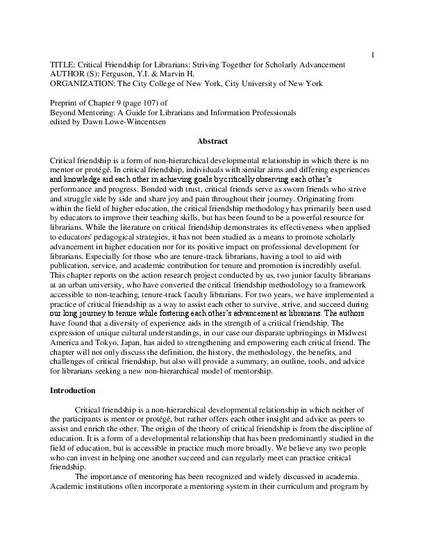
Contribution to Book
Critical Friendship Striving Together for Scholarly Advancement
Beyond Mentoring: A Guide for Librarians and Information Professionals
(2016)
Abstract
Critical friendship is a form of non-hierarchical developmental relationship in which there is no mentor or protégé. In critical friendship, individuals with similar aims and differing experiences and knowledge aid each other in achieving goals by critically observing each other’s performance and progress. Bonded with trust, critical friends serve as sworn friends who strive and struggle side by side and share joy and pain throughout their journey. Originating from within the field of higher education, the critical friendship methodology has primarily been used by educators to improve their teaching skills, but has been found to be a powerful resource for librarians. While the literature on critical friendship demonstrates its effectiveness when applied to educators' pedagogical strategies, it has not been studied as a means to promote scholarly advancement in higher education nor for its positive impact on professional development for librarians. Especially for those who are tenure-track librarians, having a tool to aid with publication, service, and academic contribution for tenure and promotion is incredibly useful. This chapter reports on the action research project conducted by us, two junior faculty librarians at an urban university, who have converted the critical friendship methodology to a framework accessible to non-teaching, tenure-track faculty librarians. For two years, we have implemented a practice of critical friendship as a way to assist each other to survive, strive, and succeed during our long journey to tenure while fostering each other’s advancement as librarians. The authors have found that a diversity of experience aids in the strength of a critical friendship. The expression of unique cultural understandings, in our case our disparate upbringings in Midwest America and Tokyo, Japan, has aided to strengthening and empowering each critical friend. The chapter will not only discuss the definition, the history, the methodology, the benefits, and challenges of critical friendship, but also will provide a summary, an outline, tools, and advice for librarians seeking a new non-hierarchical model of mentorship.
Keywords
- Mentorship,
- Critical Friendship,
- Librarianship
Disciplines
Publication Date
Fall November 17, 2016
Editor
Dawn Lowe-Wincentsen
Publisher
Chandos Publishing
ISBN
978-0-08-101294-9
Citation Information
"Critical Friendship Striving Together for Scholarly Advancement" CambridgeBeyond Mentoring: A Guide for Librarians and Information Professionals (2016) p. 107 - 124 Available at: http://works.bepress.com/LenaMarvin/4/
